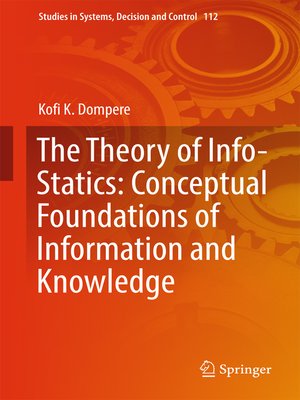The Theory of Info-Statics
ebook ∣ Conceptual Foundations of Information and Knowledge · Studies in Systems, Decision and Control
By Kofi K. Dompere

Sign up to save your library
With an OverDrive account, you can save your favorite libraries for at-a-glance information about availability. Find out more about OverDrive accounts.
Find this title in Libby, the library reading app by OverDrive.



Search for a digital library with this title
Title found at these libraries:
| Library Name | Distance |
|---|---|
| Loading... |
This book discusses the development of a theory of info-statics as a sub-theory of the general theory of information. It describes the factors required to establish a definition of the concept of information that fixes the applicable boundaries of the phenomenon of information, its linguistic structure and scientific applications. The book establishes the definitional foundations of information and how the concepts of uncertainty, data, fact, evidence and evidential things are sequential derivatives of information as the primary category, which is a property of matter and energy. The sub-definitions are extended to include the concepts of possibility, probability, expectation, anticipation, surprise, discounting, forecasting, prediction and the nature of past-present-future information structures. It shows that the factors required to define the concept of information are those that allow differences and similarities to be established among universal objects over the ontological and epistemological spaces in terms of varieties and identities. These factors are characteristic and signal dispositions on the basis of which general definitional foundations are developed to construct the general information definition (GID). The book then demonstrates that this definition is applicable to all types of information over the ontological and epistemological spaces. It also defines the concepts of uncertainty, data, fact, evidence and knowledge based on the GID. Lastly, it uses set-theoretic analytics to enhance the definitional foundations, and shows the value of the theory of info-statics to establish varieties and categorial varieties at every point of time and thus initializes the construct of the theory of info-dynamics.







